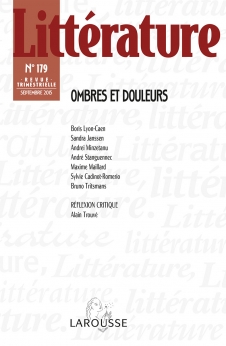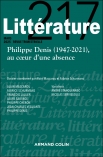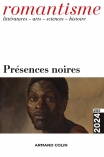
Littérature n° 179 (3/2015)
Pour acheter ce numéro, contactez-nous
Recevez les numéros de l'année en cours et accédez à l'intégralité des articles en ligne.
La Vendetta de Balzac ouvre les Scènes de la vie privée. Qu’attendre d’une nouvelle ainsi intitulée, en 1830 ? Une représentation linéaire de l’histoire, assise sur la violence la plus archaïque et sur un respect fidèle des valeurs héritées du passé ? À la faveur d’un tel horizon d’attente, l’intrigue s’ouvre en fait à une critique de la raison tragique, à une réflexion sur les aléas de la vie et sur la production de l’égarement ; elle permet au romancier de dramatiser sa passion du présent – en exaltant le présent des passions. Et devient l’arkhè d’une comédie foncièrement humaine. L’occasion, pour nous, de penser le récit et ses pliures sur le modèle – ô combien stratégique – du cheval de Troie...
The Vendetta by Balzac opens the Scenes From Private Life. What is to be expected from a short story so entitled, in 1830 ? A linear representation of history based on the most archaic violence and on a faithful respect of the values inherited from the past ? Under cover of such a horizon of expectations, the plot actually opens to a critique of tragic reason, to a eflection about the hazards of life and about the production of distraction ; it allows the novelist to dramatize his passion for the present – by exalting the present of passions. And it becomes the arkhè of an intrinsically human comedy. It gives us the opportunity to think the narrative and its folds on the (so strategic) model of the Trojan horse...

